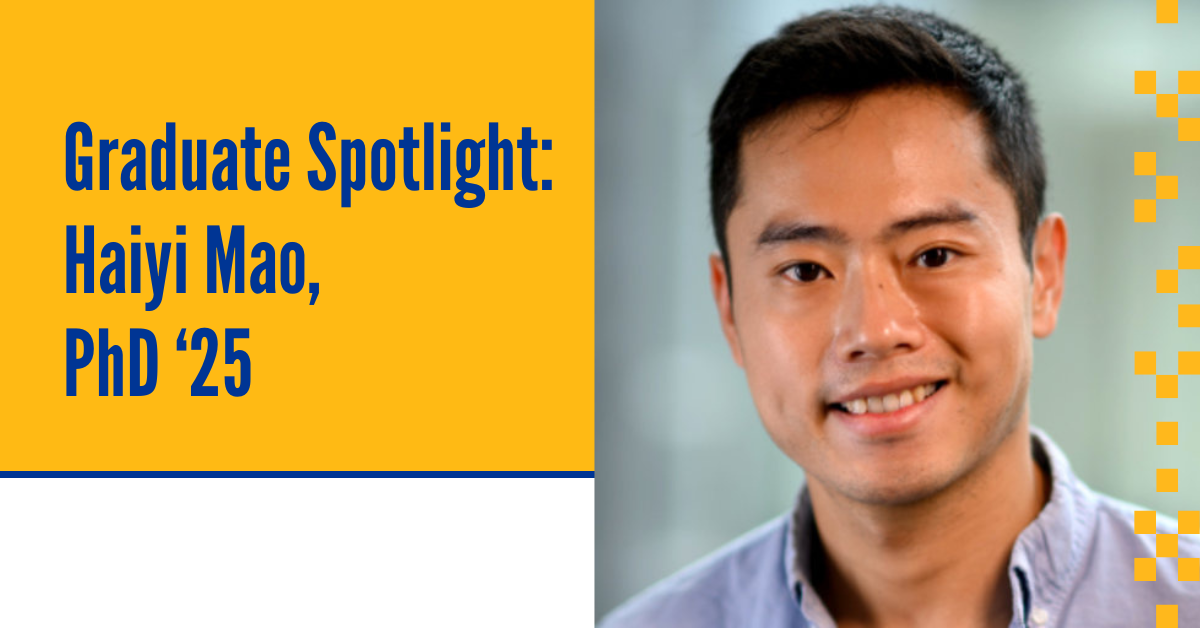As Haiyi Mao graduates from the Joint Carnegie Mellon-University of Pittsburgh PhD Program in Computational Biology (CPCB), he reflects on an experience that has enriched his life personally and professionally.
Mao earned his bachelor’s degree in computer science from Xidian University in China. He went on to graduate from Northeastern University with a master’s degree in computer science. After graduation, Mao worked for a startup in Boston as a machine learning engineer. However, he soon discovered he wanted more from his career.
“I felt like my job was getting kind of boring, and I wanted to apply machine learning to something more meaningful,” he said. “That was my motivation to start my PhD journey.”
Discovering a Passion for Biological Research
While working in Boston, Mao met researchers who were applying machine learning techniques to biological questions. He found these questions to be interesting and complicated, and he began to envision himself working in the computational biology field. The CPCB program appealed to him because he could build a biology background while having the freedom to take machine learning classes.
Mao joined CPCB in 2019, just before the COVID-19 pandemic. When lockdowns began, he channeled his focus into reading collaborative papers. This helped him discover useful tools to apply to his own research questions. Mao’s research is on applying causal representation learning to biological questions, especially single-cell omics data. In 2020, there were few researchers working in this area, but throughout his PhD program Mao has had the chance to publish papers on this topic.
“I think the most rewarding part of my PhD experience has been overcoming self-doubt by thinking hard about how to theoretically and biologically solve the problem,” he said. “I’m glad I’ve made some breakthroughs.”
Gaining Real-World Experience
Mao also completed two internships while pursuing his PhD. His first internship was with Memorial Sloan Kettering Cancer Center as a machine learning intern. There, he worked with single cell multi-modality data that opened his eyes to new technology and data processing techniques. He later worked at Genentech as a machine learning research intern, where he published a paper for a conference in Europe.
These experiences have prepared Mao for life after graduation, when he will begin a new role at Merck as a senior machine learning scientist.
“I’m excited to see all the technology develop,” he said. “With the development of technology and new data, we can apply causal machine learning to answer very important questions.”
Before he departs Pitt, Mao leaves prospective CPCB students with one important piece of advice to shape their academic journeys.
“Bolding asking questions is the most important thing PhD students or researchers need to learn.”
Three questions with the graduate:
What was your favorite class in the CPCB program?
“I liked the genomics class because it taught me to see biology problems from a computer science perspective.”
What did you enjoy about being a graduate student in Pittsburgh?
“Pittsburgh has less of a hustle culture than New York or Boston, so it’s a good place to do PhD research. You have the time and the environment to think about the problem you’re trying to solve.”
What skills have you gained from CPCB?
“I learned a lot of things, like how to do a presentation and how to communicate with people from different backgrounds. You learn how to bridge the different areas together, and I think that skill will be important in our future careers.”


